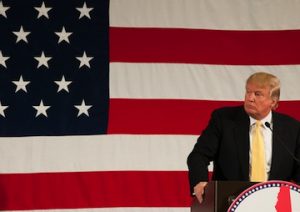Leadership Vacuum Leaves the Electorate Pissy
The nation is unhappy over Washington's many flops, and the failure of the immigration bill is the latest result of the voters' crankiness.WASHINGTON — The United States is a cranky nation in a crabby mood. To relieve our distemper, we need leadership we’re now lacking and a citizenry with greater hope in its democratic capacities.
The defeat last week of the immigration bill is the most obvious manifestation of how economic anxiety and a loss of faith in the federal government’s competence have conspired to make it far easier for politicians to say “no” than “yes,” to reject compromise on difficult questions, and to assume that voters will respond to big initiatives with mistrust.
Let it be said that while the bill suffered from disinformation campaigns and some ugly anti-Latino agitation, opposition to this well-meaning but ungainly immigration compromise was certainly not confined to mean-spirited nativists.
As a matter of simple political math, the bill’s opponents were more mobilized and more ardent than its supporters. Concessions designed to buy conservative support won few converts among restrictionists, but drove down the enthusiasm level among Latinos, business groups and liberals favorably disposed toward granting a path to citizenship for some 12 million illegal immigrants.
Under the circumstances, it was politically more attractive to make Lou Dobbs happy than to give President Bush a victory. Republican senators — three-quarters of whom voted to block the bill — seemed eager to declare their independence from Bush and to appease an angry part of the electorate whose votes they will need next year. They will pay a price among Latino voters — a price these Republicans decided was worth paying.
But there was a larger reason why this bill crashed. About two weeks before it died, I sat down with Sen. Evan Bayh, D-Ind., who up to that point had voted to let the bill go forward. Bayh was blue about the legislation’s prospects, and his explanation had more to do with the political climate than with its particulars — although he cited some of those in explaining why he voted, in the end, to block a measure he called “a theoretical hodgepodge.”
“The timing of this is all wrong,” Bayh said. “There’s a tremendous amount of middle-class anxiety in the country right now,” and anger over immigration reflected “the complete lack of a domestic agenda to address the needs of the middle class” in areas such as healthcare, pensions and education. When voters saw Congress directing its attention to 12 million illegal immigrants, he said, “they asked: ‘When are you going to get around to me? Are you going to get around to me?’ “
Bayh himself strongly favors legalizing the status of the 12 million. He opposed some of the bill’s more punitive sections and sided with Latino groups in trying to strengthen the rules on family reunification.
But he said he understood why many voters weren’t buying immigration reform this year. “When people are feeling more secure about their own situations, they’re more willing to welcome others,” he said in a follow-up interview Monday. “If we had moved first to address the middle class’ anxieties, we would have had a much better chance of success.”
And the strongest arguments in the restrictionists’ arsenal played on a widespread belief that the federal government was too incompetent to enforce whatever tough provisions the bill contained. Bayh pointed to poor planning for the Iraq war and the failure to rebuild New Orleans after Katrina as leading inevitably to skepticism. “A government that’s going to permit that is suddenly going to know how to make an entirely new employment system work?” Bayh asked.
The skepticism about government is currently directed against Bush, against conservatives and against Republicans. But this should give Democrats little comfort. As Democratic pollster Stanley Greenberg argues in the current issue of The American Prospect, “there is a perverse consequence brought about by the scale of conservatives’ failure.”
The problem, Greenberg says, “is that conservatives have failed in ways that have undermined Americans’ sense of collective capacity. Their failure has communicated not just their own incompetence, but also the message that government in general is incompetent.
“By failing so dramatically,” Greenberg continues, “conservatives have created a significant roadblock for Democrats: They have undermined people’s faith in the very instrument that we as progressives want to use to solve problems.”
The belief that government action is futile ultimately killed the immigration bill, and it could block large-scale reform efforts for a long time to come. A cranky nation rarely undertakes great tasks, especially when achieving them demands a degree of trust, and hope.
E.J. Dionne’s e-mail address is postchat(at)aol.com.
© 2007, Washington Post Writers Group
Your support matters…Independent journalism is under threat and overshadowed by heavily funded mainstream media.
You can help level the playing field. Become a member.
Your tax-deductible contribution keeps us digging beneath the headlines to give you thought-provoking, investigative reporting and analysis that unearths what's really happening- without compromise.
Give today to support our courageous, independent journalists.






You need to be a supporter to comment.
There are currently no responses to this article.
Be the first to respond.